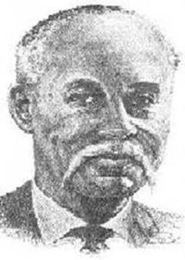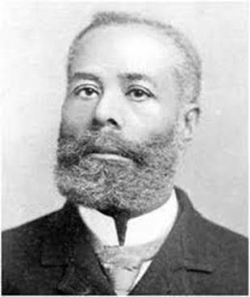Black Americans made significant and lasting impacts on the railroading industry. Please join us in celebrating the innovations of two such leaders: Andrew Jackson Beard and Elijah McCoy.
 Andrew Jackson Beard (1849-1921)
Andrew Jackson Beard (1849-1921)
Andrew Jackson Beard lived an extraordinary life as a Black inventor born in the 1800s. Beard revolutionized railroad safety with his invention of the Jenny automatic car coupler, which aimed to improve the knuckle coupler patented by Eli Janney in 1873 (patent US138405).
The knuckle coupler did the dangerous job of hooking railroad cars together, previously done manually by placing a pin in a link between the two cars. Beard himself lost a leg in a car coupling accident. As an ex-railroad worker, Beard’s experience prompted a tool that likely saved countless lives and limbs.
Unlike the vast majority of inventors who never profit from their patents, Beard received $50,000—just shy of $1.5 million in today’s dollars—for the patent rights to his Jenny coupler. Beard also patented two rotary steam engine designs. Patent US433847 was granted in 1890 and Patent US478271 in 1892. It is unknown whether those patents were profitable for him.
Andrew Jackson Beard was inducted into the National Inventors Hall of Fame in 2006.
Elijah McCoy (1844–1929)
 At an early age, Elijah McCoy showed a strong interest in mechanics. At 15, he travelled to Scotland for an apprenticeship in mechanical engineering, returning home to Michigan certified as a mechanical engineer.
At an early age, Elijah McCoy showed a strong interest in mechanics. At 15, he travelled to Scotland for an apprenticeship in mechanical engineering, returning home to Michigan certified as a mechanical engineer.
Despite his qualifications, McCoy was unable to find work as an engineer in the United States due to racial barriers. Skilled professional positions were not available to African Americans, regardless of their training or background.
McCoy accepted a position as a fireman and oiler for the Michigan Central Railroad. It was in this line of work that he developed his first major invention. After studying the inefficiencies inherent in the existing system of oiling axles, McCoy invented a lubricating cup that distributed oil evenly over the engine’s moving parts. He obtained a patent for this invention, which allowed trains to run continuously for long periods of time without stopping for maintenance.
McCoy continued to refine his devices, receiving nearly 60 patents over the course of his life. While the majority of his inventions related to lubrication systems, he also developed designs for an ironing board, a lawn sprinkler and other machines.
Although McCoy’s achievements were recognized while he was alive, his name did not appear on the majority of the products that he designed. Lacking capital to support the manufacturing of his lubricators in large numbers, he typically assigned his patent rights to his employers or sold them to investors. In 1920, toward the end of his life, McCoy formed the Elijah McCoy Manufacturing Company to produce lubricators bearing his name.
To learn more, visit the Biography website.



